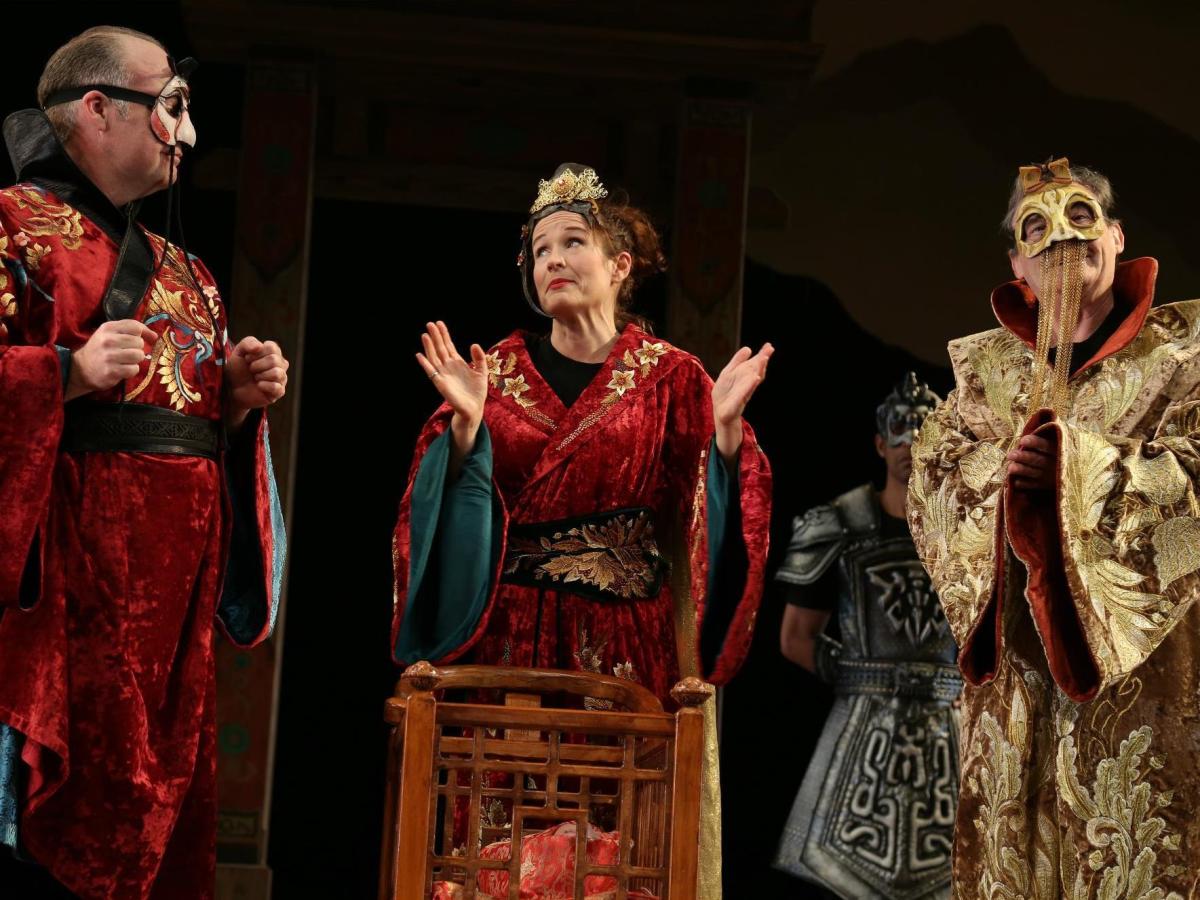Luke Hewitt, Caitlin Beresford-Ord and Geoff Kelso in Black Swan’s The Caucasian Chalk Circle. Image by Philip Gostelow.
This unusual WA theatrical performance of Bertolt Brecht’s The Caucasian Chalk Circle is a Chinese-Australian co-production, and features some amazing high points as well as other aspects that are less successful. It is a significant work, marking the 25th anniversary of Black Swan’s foundation and has been staged thanks to Artistic Director Kate Cherry’s friendship with the National Theatre of China’s artistic director Dr Wang Xiaoying, who directs this performance.
The packed opening night audience included a large proportion of Perth’s Chinese community, who were catered for with Chinese surtitles.
Music is a key narrative device in The Caucasian Chalk Circle, which is inspired by an 800 year old Yuan dynasty classical Chinese fable, ‘The Circle of Chalk’. The story revolves around a servant girl, Grusha, who takes in the baby son of her wealthy employers during a war and brings him up as her own. Eventually the biological mother, the Governor’s Wife, goes to the judge to claim her son amidst discussions of right and wrong.
The actors, who play multiple roles, are dressed in Chinese-style costumes and in a master stroke mostly wear masks based on their physiognomy, which work remarkably well in terms of both concealing and making emotions ‘writ large’.
This performance is a highly recommended experience, but be warned that the conventions of Peking Opera (from the late 18th century) may not be that easy to assimilate. The style blends speech, song, dance and movement to narrate the story and illustrate the character rather than utilising realistic dialogue. Some may label it ‘naïve’ theatre, but its reliance on symbolic roles and suggestion means that attention must be paid to small details such as the colour of costumes and role allocation. The masks are important in symbolising the personality, characteristics and fate of characters, so you may find the braid hanging humorously from some fellow’s moustache an indicator that his character is laughing at himself.
A melodramatic style of over-acting is contrasted with moments of subtlety, such as the love story between Grusha the maid and Simon the soldier, and the ensemble work is fantastic, though some singular performances stand out. Geoff Kelso as Azdak the Judge is exceptional; he wittily portrayed this memorable character with complex judicial logic tripping off his tongue and cleverly inserted current references to our legal system. Alex Malone as the central character of Grusha was sublime. Her performance and singing was spot on and this performance marks her debut with the company; it would be a pleasure to see this young actor in continuing challenging roles. James Sweeney had great brio in his performance of Simon the loving soldier. Adam Booth disturbed with his performance of the lascivious Iron shirt while Caitlin Beresford-Ord has such a regal air with her Governor’s Wife role that it was a shock to see her quietly in another supporting role. Kylie Farmer performed the Mother-In-Law role to comic perfection.
There is a poignant moment when a circle of 10 actors sings around Grusha the maid as she re-swaddles her babe during the mountain walk and sings to herself. A comic highlight was the Brechtian language of the Monk officiating at the wedding and switching between wedding vows and funeral farewells with mixed metaphors.
Dr Clint Bracknell is the musical director and also performs, along with Arunachala on percussion. The music sometimes distracts from the integrated aspects of the rest of the performance. It felt quite monotonous, and even though the Director’s program notes reference a Southeast Asian style of percussion, it is more in regards to the repetition of the one themed songs that are frequent and form a vital part of the plot narrative. There are some weak singers in the overall strongly-voiced cast, and when these singers are highlighted it detracted from the otherwise professional performance.
The set design by Richard Roberts was both clever and simple, such as a beautiful mountainscape evoked through simple lines, and the lighting by Mark Howett was great. The archway/doorway was cleverly used to create spaces in seconds. We moved effortlessly from city centre, palace, mountain tops, peasant hut, and a dying man’s sick room facilitated by the brilliant imaginations of the designers and director.
The performance concludes as it started; the actors stripped to their black ‘warm up gear’ taking their bows whilst at the start they wander around exercising before moving into their black circle of movement. The symbolic rendering that we are both individuals but part of the greater symbolic role of the mass (or our roles as judge, soldier, mother) is clear as the actors come full circle with their stripping of character and costume; though the actors become ‘less’ after they strip themselves of costumes in front of us, an indication of how much their immersion in their roles helped the audience commit to this great performance experience.
Rating: 4 stars out of 5
Black Swan State Theatre Company’s
The Caucasian Chalk Circle
Written by Bertolt Brecht
Translated by Ralph Manheim
Directed by Dr Wang Xiaoying
Set Designer: Richard Roberts
Costume Designer: Zhao Yan
Prop/Mask Designer: Zhang Huaxiang
Composer/Musical Director/Sound Designer: Clint Bracknell
Lighting Designer: Mark Howett
Assistant Directors: Chen Tao & Felix Ching Ching Ho
Percussionist: Arunachala
Guitarist: Clint Bracknell
Cast: Caitlin Beresford-Ord, Adam Booth, Kylie Farmer [Kaarljilba Kaardn], Luke Hewitt, Geoff Kelso, Alex Malone, Felicity McKay, Lynette Narkle, Kenneth Ransom, James Sweeny, Steve Turner and Alison van Reeken
Heath Ledger Theatre, State Theatre Centre of WA
30 July – 14 August 2016






